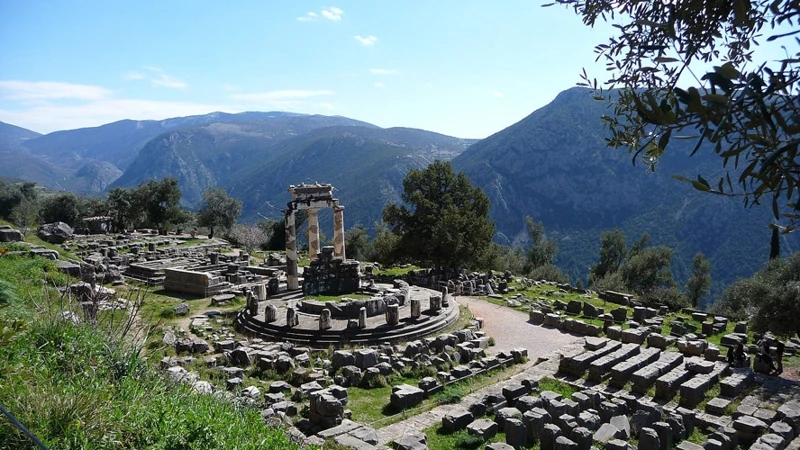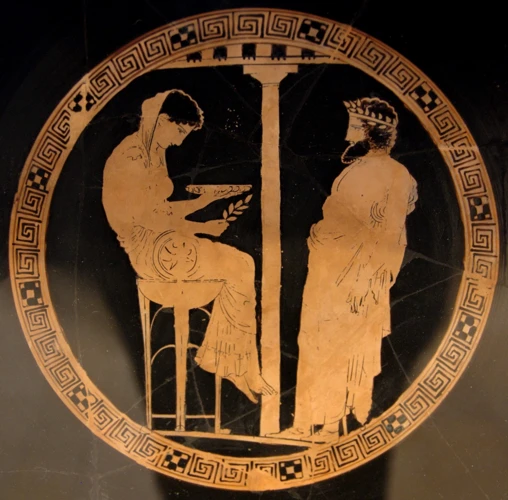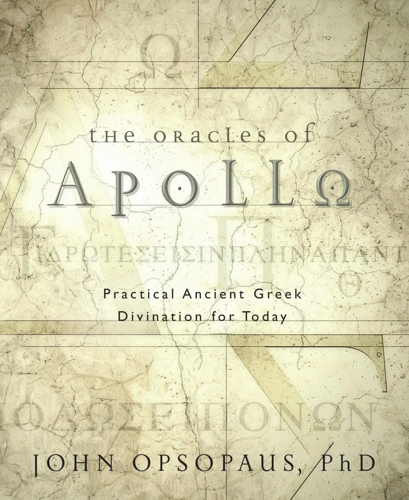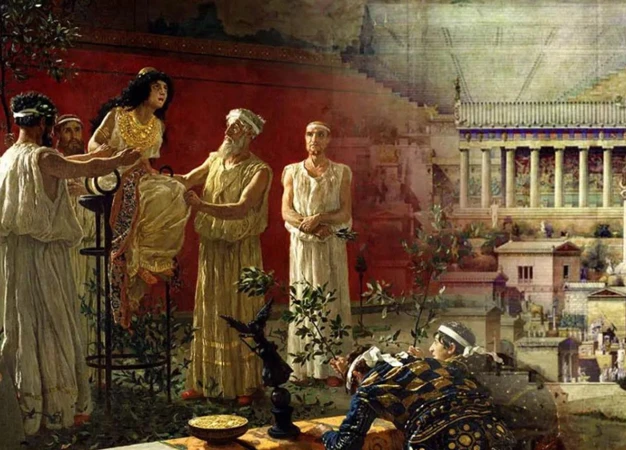The Enigmatic Oracle of Delphi: Mysteries and Prophecies in Greek Mythology
Step into the fascinating world of ancient Greek mythology as we unravel the mysteries surrounding the Oracle of Delphi. Nestled in the picturesque mountains of central Greece, the Oracle’s prophetic powers were renowned throughout the ancient world. Connected to the Greek god Apollo, the Oracle served as the mouthpiece of the gods, providing cryptic and often perplexing messages to those who sought her guidance. From the enigmatic prophecies that shaped the course of history to the controversies surrounding her powers, join us on a journey to discover the secrets and legacy of the Oracle of Delphi.
The Oracle of Delphi: Origins and Importance

The Oracle of Delphi, with its origins rooted in ancient Greek mythology, holds immense importance in the realm of divination and prophecy. Located on the slopes of Mount Parnassus, the Oracle served as a conduit between mortals and the gods, specifically the god Apollo. Legends say that Apollo slew the serpent Python and established the Oracle to honor his victory. The Oracle’s significance was further solidified by the Oracle’s role in the Pythian Games, a quadrennial athletic and musical competition that attracted participants from all over Greece. The Oracle’s utterances were highly sought after, as they were believed to hold vital insights and guidance for individuals, cities, and even entire nations. The Oracle’s influence extended beyond Greece, with leaders and rulers consulting her before going to war or making crucial decisions. The Oracle’s enigmatic messages and prophecies shaped the course of history, and even though the Oracle’s exact methods and techniques remain shrouded in mystery, her impact on Greek mythology and society cannot be underestimated.
1. The Oracle’s Location and Setting
The Oracle of Delphi resided in a unique and awe-inspiring location on the slopes of Mount Parnassus in central Greece. Positioned above the sanctuary of Apollo, the Oracle’s setting was as mystical as her predictions. Surrounded by natural beauty, it was believed that the site exuded an otherworldly energy, enhancing the Oracle’s connection to the divine. The location itself was elevated, with breathtaking views of the surrounding landscape, including the olive groves and the sparkling waters of the Bay of Corinth in the distance. The Oracle’s chamber, known as the adyton, was a secluded inner sanctum within the Temple of Apollo, accessible only to select priests and priestesses. This seclusion added an air of mystery and sanctity to the Oracle’s pronouncements, heightening the anticipation and reverence of those who sought her wisdom. The physical environment, combined with the spiritual significance of the location, undoubtedly played a role in shaping the aura and importance of the Oracle of Delphi.
2. Apollo’s Connection to the Oracle
Apollo’s connection to the Oracle of Delphi is deeply intertwined with the origins and significance of the Oracle itself. In Greek mythology, Apollo is not only the god of the sun and music but also the god of prophecy and healing. The Oracle of Delphi was considered Apollo’s sacred sanctuary, where he communicated with mortals through the Oracle’s trance-induced prophecies. According to ancient tales, Apollo assumed control of Delphi after slaying the Python, a massive serpent that guarded the site. This act solidified Apollo’s authority and established the Oracle as a place of divine communication. The connection between Apollo and the Oracle was further strengthened by the existence of a sacred precinct known as the “Temple of Apollo.” The temple housed the Oracle and served as a platform for Apollo’s prophetic revelations. It was here that the Pythia, the priestess of the Oracle, would enter into a state of trance and deliver messages from the gods. This profound connection between Apollo and the Oracle of Delphi cemented the Oracle’s role as the paramount source of prophecy in Greek mythology and society.
3. The Pythian Games
The Pythian Games were a prominent sporting and cultural event in ancient Greece that held a close association with the Oracle of Delphi. These games, held every four years, brought together athletes from different regions to compete in various events, including athletics, musical competitions, and chariot races. The Pythian Games were named after the mythical serpent Python, which Apollo defeated before establishing the Oracle. The games served as a means of honoring Apollo’s victory and showcasing the prowess of the participating athletes. Winners of the Pythian Games were awarded crowns of laurel leaves, symbolizing their excellence and connection to the god Apollo. The Pythian Games, along with the Olympics, Nemean Games, and Isthmian Games, constituted the Panhellenic Games, which reflected the unity and shared cultural heritage of the Greek city-states. The games not only fostered friendly competition but also served as a platform to celebrate the arts and strengthen the spiritual significance of the Oracle.
The Delphic Oracle’s Prophecies

The Delphic Oracle was renowned for her prophecies, which held great significance in the ancient Greek world. The process of prophecy began with the Pythia, the priestess who served as the Oracle’s mouthpiece. The Pythia would enter a trance-like state, often induced by inhaling the vapor rising from a chasm in the Temple of Apollo. While in this altered state of consciousness, the Pythia would receive messages from the gods, which she would then convey to those seeking her guidance.
The prophecies delivered by the Delphic Oracle were both revered and feared for their ambiguous nature. The Oracle’s words were often cryptic, leaving room for various interpretations. This aspect of her prophecies sparked curiosity and intrigue among those who received them. The messages were not straightforward, and it was up to the recipients to discern the true meaning behind the Oracle’s words. This ambiguity allowed for a certain level of flexibility, as individuals could interpret the prophecies to suit their own desires or agendas.
Famous prophecies from the Delphic Oracle have left lasting impacts. One such prophecy was given to King Croesus of Lydia, who sought advice on whether he should wage war against the Persian Empire. The Oracle’s response, “If you cross the river, a great empire will be destroyed,” led Croesus to believe he would be victorious. However, the empire that ended up being destroyed was his own. This instance highlights the treacherous nature of interpreting the Oracle’s messages.
Another famous prophecy surrounded the legendary Greek hero, Oedipus. The Oracle foretold that he would kill his father and marry his mother. Desperate to avoid this fate, Oedipus unknowingly fulfilled the prophecy, leading to tragic consequences. These prophecies, and countless others, demonstrate the inexplicable power and influence held by the Delphic Oracle, shaping the destinies of individuals and civilizations alike.
The Delphic Oracle’s prophecies continue to captivate scholars and enthusiasts today. Exploring the enigmatic nature of her utterances, researchers strive to unravel the true meaning behind her words. The Oracle’s prophecies serve as a testament to the mystical and divine elements deeply ingrained in Greek mythology and the collective imagination of ancient societies. Understanding the intricacies of these prophecies sheds light on the intricate tapestry of beliefs and symbolism woven throughout Greek mythological narratives. (source: Unraveling Greek Mythology: A Historical Perspective)
1. The Process of Prophecy: Pythia and Her Trance
The process of prophecy at the Oracle of Delphi revolved around Pythia, the trance-induced priestess who served as the messenger of the gods. Pythia, also known as the Pythian priestess, would enter a sacred chamber known as the adyton, situated within the Temple of Apollo. To prepare for her prophetic trance, Pythia would cleanse herself with spring water and chew on laurel leaves, which were believed to have mystical properties. Once in the trance state, Pythia would sit on a tripod over a fissure in the earth, through which vapors would rise. These vapors were said to be the breath of Apollo, enabling Pythia to connect with the divine realm and receive messages from the gods. In her trance, Pythia would utter cryptic and ambiguous phrases, believed to be the words of Apollo himself. These utterances would then be interpreted by priests of the Oracle, known as prophetai, who would relay the message to those seeking guidance. The trance-induced state of Pythia during the process of prophecy added to the mysterious aura surrounding the Oracle of Delphi and heightened the perceived legitimacy of her prophetic powers.
2. Famous Prophecies and their Impact
Famous prophecies from the Oracle of Delphi reverberated throughout ancient Greek society, leaving a lasting impact on individuals and the course of events. One notable prophecy was given to King Croesus of Lydia, who sought guidance before engaging in a war with Persia. The Oracle cryptically warned him that if he went to war, a kingdom would fall. Misinterpreting the prophecy, Croesus launched an attack, only to suffer a devastating defeat, resulting in the fall of his own kingdom. Another renowned prophecy involved the Athenian statesman Themistocles. The Oracle advised him to “trust the wooden wall,” which Themistocles understood as a suggestion to fortify the Athenian navy. This decision proved crucial in the Persian Wars, as Athens achieved a decisive victory against the invading Persian forces. These prophecies showcased the power and influence of the Oracle, demonstrating her ability to shape the destiny of nations and individuals.
The Enigma of Delphic Oracle’s Utterances

The Delphic Oracle’s utterances were renowned for their cryptic nature, leaving those who sought her guidance perplexed and eager for interpretation. Often delivered in the form of ambiguous riddles or enigmatic phrases, the Oracle’s words required careful analysis and a deep understanding of symbolism and metaphor. It was believed that the Oracle’s messages were inspired by the god Apollo himself, and her trance-like state during the process of prophecy further added to the mystical aura surrounding her utterances. Scholars and priests known as “interpreters” were tasked with unraveling the meaning behind the Oracle’s words, attempting to decipher the messages and provide guidance to those who sought it. However, despite their best efforts, the interpretations often differed, leaving room for multiple possibilities and interpretations. Some theories suggest that the cryptic nature of the utterances allowed the Oracle to maintain an air of mystery and allure, enhancing her role as a conduit between mortals and the gods. The complexity and enigma surrounding the Delphic Oracle’s utterances continue to fascinate historians and mythologists alike, offering a glimpse into the profound and mysterious world of ancient Greek divination.
1. Ambiguous and Cryptic Messages
The Oracle of Delphi was famous for delivering ambiguous and cryptic messages, often leaving those who sought her guidance perplexed and searching for deeper meaning. The Oracle’s prophetic utterances were known as “oracles,” and they were not straightforward predictions or clear answers. Instead, they were veiled in symbolism and riddles, requiring careful interpretation. This ambiguity was intentional, as the Oracle believed that the true understanding of the messages would only come to those who possessed wisdom and insight. The symbolic language used by the Oracle often drew on themes from Greek mythology, referencing gods, goddesses, and mythical creatures. For example, an oracle might mention the mythical beast Chimera, symbolizing a situation with multiple conflicting elements. Deciphering the Oracle’s messages was an art in itself, with priests and interpreters trained in understanding the depths of Greek mythology and the symbolism used in the oracles. These cryptic messages added an air of mystique to the Oracle of Delphi and made each consultation a journey of interpretation and discovery.
2. Interpreting the Oracle’s Words
Interpreting the Oracle’s words was no easy task, as they were often shrouded in ambiguity and open to various interpretations. The Oracle of Delphi delivered her prophecies in a trance-like state, attributed to the influence of Apollo and the vapors emanating from the sacred chasm within the temple. The prophetess, known as the Pythia, would utter her cryptic messages, which were then transcribed by priests known as the Delphic interpreters. These messages were often convoluted, using metaphorical language and riddles. It was up to the seekers of the Oracle’s guidance to decipher the true meaning behind the words. Sometimes, the interpretations were straightforward, guiding individuals and communities towards a certain path. Other times, the messages were intentionally obscure, challenging those seeking advice to reflect on their own circumstances and make their own conclusions. The process of interpreting the Oracle’s words was a combination of intuition, knowledge of Greek mythology, and the art of divination. Scholars and historians still study the inscriptions and records to unravel the riddles of the Oracle’s prophecies, shedding light on the wisdom and enigmatic nature of her words.
Challenges and Controversies

Challenges and Controversies
While the Oracle of Delphi commanded great respect and reverence, it was not without its skeptics and controversies. One of the major challenges faced by the Oracle was skepticism regarding the validity and accuracy of her prophecies. Skeptics argued that the ambiguous nature of the Oracle’s utterances allowed for multiple interpretations, making it easy to fit the prophecies to events after they occurred—a phenomenon known as retroactive clairvoyance. Critics questioned the Oracle’s reliance on Pythia, the priestess through whom Apollo spoke. Pythia would enter a prophetic trance, sometimes characterized by strange behavior and incomprehensible speech. Skeptics suggested that the priestess may have been under the influence of hallucinogenic gases emitted from the underground chamber where she delivered the prophecies. Another controversy that surrounded the Oracle of Delphi was the potential influence of politics and power on the prophecies. Some believed that individuals with connections and wealth could manipulate the Oracle to provide favorable prophecies or advice, therefore compromising the integrity of the divination process. Whether these challenges were true or not, they added to the air of intrigue and mystery that surrounded the Oracle of Delphi.
1. Skepticism and Skeptics of the Oracle
Skepticism surrounding the Oracle of Delphi and her prophecies was not uncommon in ancient Greece. Despite the Oracle’s fame and influence, there were those who doubted the legitimacy of her powers. Many skeptics pointed to vague and ambiguous statements made by the Oracle as evidence of her fallibility. Critics argued that the Oracle’s supposed divination was simply a result of clever wordplay and manipulation of her audience. Additionally, it was claimed that the Oracle’s prophecies could be interpreted in various ways, allowing them to be applicable to a wide range of situations. Some skeptics even suggested that the Oracle’s trances and utterances were simply the effects of hallucinogenic gases emitted by a chasm in the temple. These doubts and conflicting opinions created a division among the people, with some fervently believing in the Oracle’s foresight while others dismissed it as mere charlatanism. Despite the skepticism, the Oracle of Delphi continued to hold immense influence and her prophecies continued to shape the course of events in ancient Greece.
2. Influence of Politics and Power on Prophecies
The influence of politics and power on the prophecies of the Oracle of Delphi cannot be overlooked. The Oracle’s cryptic messages held immense sway over the decisions made by leaders and rulers, making it a coveted tool in the realm of politics. It is believed that some politicians and military strategists sought the Oracle’s prophecies not for genuine guidance but rather to manipulate her words to suit their own agendas. In some instances, prophecies were deliberately misinterpreted or selectively followed to justify actions or gain an advantage in power struggles. This manipulation of the Oracle’s words had far-reaching consequences, shaping the course of wars, alliances, and even the fates of entire civilizations. The Oracle’s involvement in political affairs also led to accusations of corruption and bribery, as individuals sought to influence her oracles through monetary offerings or other means. Despite the potential for misuse, the reputation and influence of the Oracle on political decision-making persisted throughout ancient Greek society.
The Decline and Legacy of the Oracle
The Decline and Legacy of the Oracle
1. Decline of the Oracle’s Influence:
As the centuries passed, the Oracle of Delphi experienced a decline in its influence and reputation. Various factors contributed to this decline, including the rise of Christianity, which led to a decrease in the importance of pagan practices and oracles. Additionally, the decline of the Greek city-states and the political instability of the region played a role in diminishing the Oracle’s prominence. As new centers of power emerged and civilizations shifted, the Oracle’s role as a guiding force began to wane.
2. Modern-Day Interest in the Oracle:
Despite its decline, the Oracle of Delphi still holds a significant legacy in modern times. The archaeological remains of the site continue to attract visitors from all over the world, seeking a glimpse into the ancient mystery and wisdom associated with the Oracle. Scholars and historians are continually fascinated by the enigmatic prophecies and cryptic utterances that have been recorded in ancient texts. The Oracle’s influence can also be seen in popular culture, with references to her appearing in books, movies, and other media. Today, the Oracle of Delphi stands as a symbol of the ancient world and its connection to the divine, leaving a lasting legacy that continues to captivate and intrigue enthusiasts of Greek mythology and history.
References:
– Mythical Beasts in Greek Mythology: Symbolism and Meaning
– Unraveling Greek Mythology: A Historical Perspective
– The Role of Greek Goddesses in Ancient Society
1. Decline of the Oracle’s Influence
1. Decline of the Oracle’s Influence
The once-mighty influence of the Oracle of Delphi eventually waned as the ancient world evolved. Several factors contributed to the decline of her power and prominence. One significant factor was the rise of skepticism and rational thinking in the Hellenistic period. As Greek society became more focused on science, philosophy, and empirical reasoning, the Oracle’s prophetic abilities were viewed with increasing doubt. Critics argued that the Oracle’s cryptic utterances were simply the result of vague language and could be interpreted to fit any situation. Additionally, the influence of politics and power on the prophecies led to a loss of faith in the Oracle’s impartiality. It was believed by some that influential individuals or city-states could manipulate the Oracle’s responses for their own gain. These doubts and controversies surrounding the Oracle’s authenticity gradually eroded the trust and belief in her powers. Eventually, with the rise of Christianity and the decline of the Greek pantheon, the Oracle of Delphi’s influence faded into obscurity. However, despite her diminished role, the Oracle’s enigmatic legacy continues to captivate and intrigue modern-day historians, offering a glimpse into the mystical world of ancient Greek mythology.
2. Modern-Day Interest in the Oracle
Modern-day interest in the Oracle of Delphi continues to captivate scholars, historians, and enthusiasts alike. While the Oracle itself ceased to function centuries ago, its enigmatic legacy persists. People are fascinated by the mysteries surrounding the Oracle’s prophecies and seek to unravel the meaning behind its cryptic utterances. The Oracle’s influence can be seen in various forms of popular culture, with references in literature, movies, and even video games. Additionally, archaeological discoveries and ongoing research shed new light on the rituals and practices associated with the Oracle. The remains of the Temple of Apollo at Delphi and the ancient artifacts discovered in the vicinity continue to provide valuable insights into the Oracle’s significance. As the allure of Greek mythology persists, interest in the Oracle of Delphi remains strong, keeping its legacy alive in the modern world.
Conclusion
In conclusion, the Oracle of Delphi stands as an emblem of the enigmatic and mysterious aspects of ancient Greek mythology. From its origins tied to the victorious Apollo and the slaying of the Python, to its importance in the Pythian Games and the far-reaching impact of its prophecies, the Oracle held a revered position in Greek society. Despite skepticism and controversy surrounding the Oracle’s powers, it is undeniable that her utterances wielded significant influence over those who sought her guidance. The decline of the Oracle’s influence over time does not diminish the enduring fascination and interest in her legacy. Today, the Oracle of Delphi continues to captivate the imagination of scholars, historians, and enthusiasts, reminding us of the enduring power of mythology and the enigmatic nature of the ancient world.
Relive the awe-inspiring tales of Greek goddesses and their roles in ancient society.
Frequently Asked Questions
1. What made the Oracle of Delphi a revered figure in ancient Greece?
The Oracle of Delphi held a revered status due to her association with the god Apollo. Apollo was considered the god of prophecy and wisdom, and the Oracle served as his mouthpiece, delivering cryptic messages believed to be directly from the gods.
2. How did the Oracle of Delphi enter into a trance-like state for prophecy?
The Oracle, also known as Pythia, entered into a trance-like state through various means, including inhaling the fumes rising from a fissure in the ground beneath her temple. Some scholars believe these fumes may have contained hallucinogenic substances.
3. Were the prophecies of the Oracle always accurate?
The accuracy of the Oracle’s prophecies is a subject of debate. While some prophecies were remarkably accurate, others were vague or misinterpreted. It is important to remember that prophecies often required interpretation and were subject to different interpretations by those seeking guidance.
4. Can the Oracle of Delphi’s cryptic messages be deciphered?
Deciphering the Oracle’s cryptic messages was often a challenging task. The messages were delivered in riddles and ambiguous language, requiring careful interpretation. The priests and priestesses of the temple, known as the Pythia, would provide some guidance, but ultimately, it was up to the individual seeking the prophecy to interpret the message.
5. Did political leaders consult the Oracle before making important decisions?
Absolutely. Political leaders, both from Greece and neighboring regions, would often consult the Oracle before making important decisions. The Oracle’s prophecies were considered influential and sought after, especially in matters of war, alliances, and political strategies.
6. How did the decline of the Oracle’s influence occur?
The decline of the Oracle’s influence can be attributed to various factors. With the rise of Christianity, the Oracle faced increased opposition and skepticism. Additionally, political instability in the region and the decline of the Greek city-states contributed to a decline in consultation and belief in the Oracle’s prophecies.
7. How does the Oracle of Delphi continue to captivate modern-day interest?
The Oracle of Delphi continues to captivate modern-day interest due to its enigmatic nature and its connection to Greek history and mythology. The ancient site of Delphi is now an archaeological treasure, attracting visitors from around the world who are intrigued by the Oracle’s prophecies and the rich cultural heritage associated with it.
8. Were there skeptics who doubted the validity of the Oracle’s prophecies?
Yes, there were skeptics who doubted the validity of the Oracle’s prophecies. Some believed that the Oracle was a fraud or that the prophecies were open to manipulation. Others attributed the Oracle’s powers to natural phenomena or psychological factors.
9. Did women play a significant role in the priesthood of the Oracle?
Yes, women played a significant role in the priesthood of the Oracle. The Pythia, the priestess of the Oracle, was a woman chosen for her purity and ability to enter into a trance-like state. Women also held positions of power within the temple administration and were responsible for the Oracle’s rituals and ceremonies.
10. What made the prophecies of the Oracle so influential in ancient Greece?
The prophecies of the Oracle held great influence in ancient Greece due to their connection to the gods and their perceived ability to shape the course of events. Leaders and individuals looked to the Oracle for guidance and believed that following her prophecies could bring success, avoid disaster, and gain favor from the gods.








